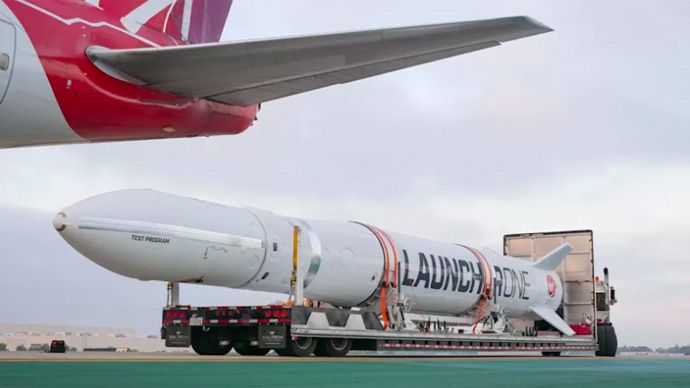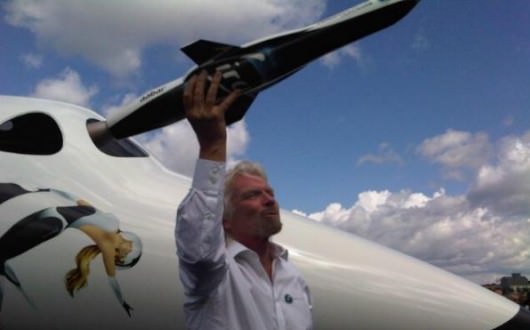The reason people use the aphorism “it isn’t rocket science” is because rocket science is hard. Virgin Orbit, a spin-off of Virgin Galactic that focuses on small satellite launches, proved that with a recent test of its LauncherOne rocket.
Continue reading “Virgin Orbit’s first air-launched rocket launch fails”Virgin Orbit Shows off its “Launcher One”, a Rocket Carried by an Airplane
The commercial space sector is about to get a little more crowded. SpaceX and Blue Origin have created headlines with their ongoing development of reusable launch vehicles. Now Virgin Orbit‘s “Launcher One” is carving out its own niche in the commercial space market, as an efficient, flexible launcher of small satellites.
Continue reading “Virgin Orbit Shows off its “Launcher One”, a Rocket Carried by an Airplane”
Virgin Galactic Announces New Satellite Launcher
Caption: Richard Branson at the Farnborough International Airshow showing a model of LauncherOne. Credit: Virgin Galactic.
Virgin Galactic’s latest venture is launching small satellites with a new, more affordable launching system called LauncherOne. “The pieces are all in place to transform the business of satellite launch, which will open up space to everyone,” said the founder of Virgin Galactic, Richard Branson. “This new vehicle will change the whole satellite industry and space-based science research.”
LauncherOne is much like the Pegasus system, operated by Orbital Sciences Corporation, which launches a rocket from an aircraft, as was done with NASA’s NuSTAR X-ray observatory. LauncherOne will be attached to the WhiteKnight plane, the mothership for SpaceShipTwo, Virgin’s commercial suborbital passenger ship.
LauncherOne could be used for smaller Earth observation and communications satellites.
Virgin Galactic has hinted previously that they were working on a rocket to put spacecraft into orbit, but they have been focusing on SpaceShipTwo. Branson announced the new launcher at the Farnborough International Airshow in the UK today.
“Small satellite launch is an area ripe for disruption,” said Virgin Galactic CEO George Whitesides. “Miniaturized satellite components and constrained budgets are driving commercial clients, academic users and government agencies all to clamor for an affordable, dedicated launch vehicle. Now,…we’re prepared to fill that void by bringing LauncherOne to market.”
Initial information about LauncherOne is that it would use a two-stage rocket powered by liquid oxygen and kerosene.
It would be capable of launching payloads of up 225kg (500lb) into low-Earth orbits, and for a price below $10 million.
“The cost of putting a satellite into space before Virgin Galactic was around $30-40 million,” Branson said. “We’ll be able to do it for under $10 million, opening up space to thousands of new groups, universities and research programs.”
LauncherOne will be built in California, with test flights starting in 2015 and commercial operations starting in 2016.
“Virgin Galactic’s goal is to revolutionize the way we get to space,” Branson said. “I’m immensely proud of what we have already achieved as we draw near to regular suborbital flights on SpaceShipTwo. Now, LauncherOne is bringing the price of satellite launch into the realm of affordability for innovators everywhere, from start-ups and schools to established companies and national space agencies. It will be a critical new tool for the global research community, enabling us all to learn about our home planet more quickly and affordably.”
Branson said he already has people lined up to book the new launcher. “Even before this official launch we have the largest order book of any new launch vehicle ever,” he said on the Virgin blog.



